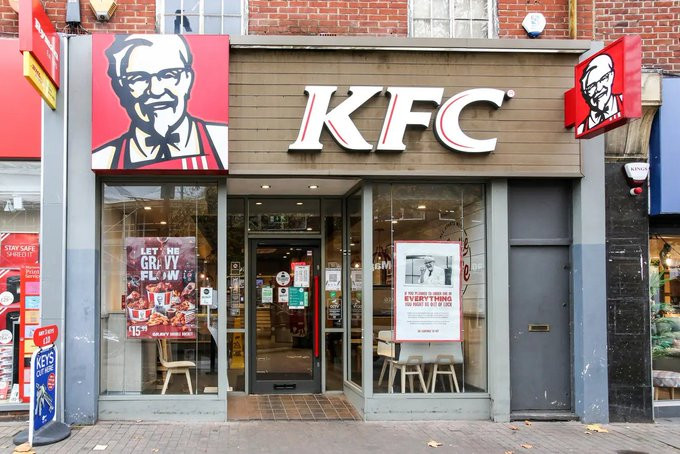In early 2018, something unthinkable happened in the UK.
KFC—a brand synonymous with fried chicken—ran out of chicken.
Not in one or two branches.
In 750 locations across the country.
The result? Chaos, outrage, and the kind of headlines no brand ever wants to see.
But instead of hiding behind legal teams or corporate jargon, KFC’s response to the crisis became one of the most iconic comeback stories in business history.
This is how they turned a logistical disaster into a viral, brand-defining moment—and what every modern company can learn from it.
It Started With a Logistics Decision
In February 2018, KFC UK made what should have been a routine change: switching its delivery provider from Bidvest, a specialist food logistics company, to DHL.
The motivation? Cost-efficiency and consolidation.
But the transition didn’t go smoothly. DHL’s supply chain failed almost immediately. Warehouses were backed up. Routes weren’t mapped properly. Distribution centers couldn’t keep up.
And then the worst happened: chicken deliveries stopped arriving.
Within days, 750 of KFC’s 900 stores in the UK had to close. Staff were sent home. Customers were livid. And yes—people actually called the police.
The UK police had to tweet a clarification:
“Please do not contact us about the #KFCCrisis – it is not a police matter.”
But for KFC, it was a full-blown brand disaster.
A PR Meltdown Begins
The British tabloids went to town.
TV news and front pages plastered headlines like “The Chicken’s Gone Cold” and “Cluck Off!”
KFC’s brand impression score dropped into negative territory, and social media lit up with ridicule, anger, and memes.
For most companies, this is where the lawyers take over. The standard playbook kicks in: polished statements, vague updates, lots of legalese, and zero emotion.
But KFC didn’t follow the script.
The Boldest Ad in Fast Food History
KFC’s marketing team made a radical decision.
Instead of minimizing the issue or hiding from it, they went straight to the public with something almost no big brand would dare attempt:
Radical transparency.
They bought full-page ads in major UK newspapers and ran a simple, unforgettable image:
A KFC bucket—with the letters rearranged to spell:
“FCK.”
Underneath? This line:
“A chicken restaurant without any chicken. It’s not ideal.”
And then:
“It’s been a hell of a week.”
No corporate buzzwords. No passive voice. Just honesty, humor, and humility.
And it worked.
From Disaster to Viral Gold
The FCK ad went viral almost instantly.
It reached over 797 million people through traditional media.
Another 219 million saw it on social.
More than 700 press articles were written about it in the following weeks.
And perhaps most importantly:
KFC’s positive attention score jumped from 7% to 29%.
They didn’t just recover—they came out stronger.
Why?
Because they did what very few brands are willing to do: be human.
The Three Hs: A New Crisis Playbook
KFC called their approach the “Three Hs”:
- Humility – They owned the mistake.
- Humor – They made light of it without being dismissive.
- Honesty – They spoke plainly, like real people.
In a world full of polished statements and tightly controlled narratives, their rawness was refreshing. It built trust—fast.
And it became a blueprint for modern brand communication.
Welcome to the Age of Authenticity
We’re in a new era of business communication.
The age of corporate perfection is dead. People don’t want brands that feel manufactured or robotic. They want honesty, flaws, realness.
It’s why Tesla is inseparable from Elon Musk, or why Patagonia’s anti-corporate ethos draws in loyalists.
In today’s world, your brand is your story. Your values. Your voice. Your ability to admit when you’ve messed up—and how you handle it afterward.
What Founders and Leaders Can Learn
For entrepreneurs, founders, and business leaders, the KFC case holds a vital lesson:
Your vulnerability is your advantage.
When you embrace the truth of your business journey—good and bad—you build something money can’t buy: authentic trust.
Your audience isn’t just buying what you sell. They’re buying why you’re doing it.
And when the chips are down, what matters isn’t avoiding mistakes.
What matters is how you respond.
The Bottom Line
KFC’s 2018 chicken shortage could have been a career-ending moment for their UK operations.
Instead, it became a marketing case study in every MBA program, a viral hit with Gen Z, and a high-water mark for brand communication.
Because they didn’t flinch.
They spoke like humans.
And in doing so, they reminded the world that brands aren’t just logos or taglines—they’re made of people.
Got a brand story worth telling? Tell it with honesty. Tell it with humor. And most importantly—tell it like a human.
